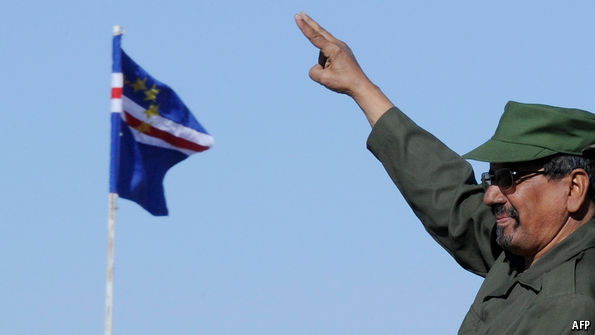
FOR forty years Muhammad Abdelaziz led his exiled people in the wilderness, promising to take them across the 1,600-mile-long Morrocan wall that bisects their homeland, and onwards to an independent Western Sahara. He died on May 31st as far from his goal as when he began. Neither 15 years of guerrilla war nor 25 years of UN-mediated talks reversed their exodus. Mr Abdelaziz leaves behind 100,000 refugees encamped in the world’s harshest desert, and perhaps four times that number under a repressive Moroccan thumb.
For most of his time as leader of the Sahrawis, the world ignored their plight. Western Sahara, a former Spanish colony, had never been a state. The UN first promised the Sahrawis a referendum on self-determination in the 1960s and has often repeated that promise, but never kept it.
Morocco sent 300,000 settlers into Western Sahara after the Spanish withdrew in 1975, chasing out large numbers of Sahrawis and annexing the territory. A UN peacekeeping mission was established in 1991 to count voters, but otherwise outsiders have largely looked the other way. For Europe, Morocco’s assistance in suppressing terrorism and migration out of Africa has made it too important an ally to risk a showdown over a forgotten cause. Its buoyant economy and the inclusion of Islamists in its political system have earned it praise, too. And who wants to revive one of the Middle East’s few dormant conflicts?
Mr Abdelaziz was an old-fashioned Marxist who, like Muammar Qaddafi of Libya, took power while only in his 20s. American admirers hailed him as a Sahrawi George Washington, but his ten successive election victories started to look about as credible as the fictional Sahrawi Arab Democratic Republic he professed to lead: even Zimbabwe’s Robert Mugabe has not lasted as long in office.
Mr Abdelaziz’s armed force, the Polisario Front, has not fought in a generation. His people are in camps where for half the year the temperature exceeds 50 degrees; other elements batter them for the rest. Rains in October 2015 washed away 18,000 tents and mud huts. Now that he is dead, Morocco hopes that a steady trickle of Sahrawis back to Western Sahara from exile in Algeria may yet become a flood.
In this they will probably be disappointed. Frustrated, resentful and now rudderless, a third generation of Sahrawi refugees are again rattling sabres.
Some refugees resort to smuggling drugs and fuel to get by; and in the Sahara the line between smugglers and jihadists is often blurry. A man called Abu Walid al-Sahrawi has declared his allegiance to Islamic State (IS), and threatened to attack Morocco’s tourism industry, the last in north Africa that has so far escaped this fate. Morocco’s ongoing spat with Algeria, which continues to harbour Polisario, increases uncertainty. Both states face a common threat from IS, but they detest each other too much to join forces against it.
For the first time in years, Western powers sound unnerved. In March Morocco’s King Muhammad expelled much of the UN’s Saharan mission after Ban Ki-moon, the UN secretary-general, described Western Sahara as occupied territory. The UN Security Council responded by giving him 90 days to let the UN mission return. Morocco is celebrating the death of Mr Abdelaziz, a man it called a mercenary, a traitor and a terrorist. But his cause will not die with him.